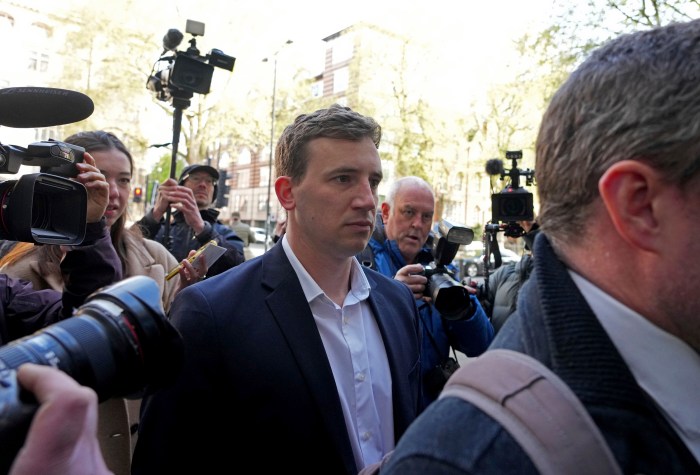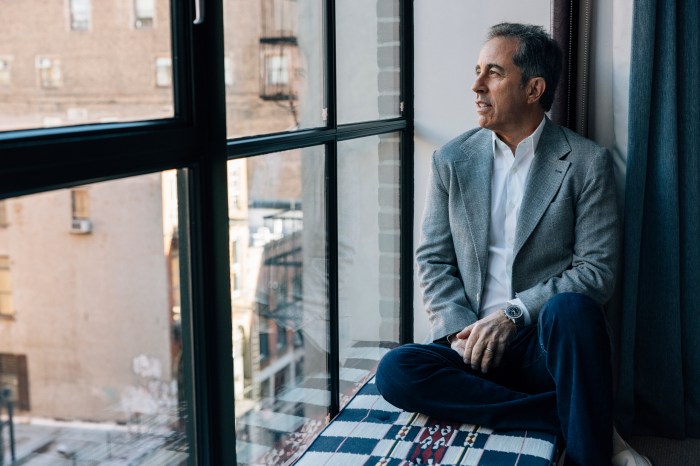I got the email in the early evening; a forwarded message giving me the address for a party being thrown by a feminist porn outfit where the “The Poetry Brothel” would be performing. I didn’t know what feminist porn was and there was no time to research the subject, but I had heard of the “The Poetry Brothel,” and they seemed to be within the purview of my blog.
I showed up about an hour after the party started and there was already a crowd in the spacious loft. At the front of the loft by the windows there were some couches and on the wall there was a screen with a constant stream of pornography playing on it. On the other side of the room (the darker side), a band was playing. Many of the women were dressed as their burlesque alter-egoes and had names like Luna Liprari and Echo Rose. There was a lot of skin, leather, bodypaint, and lace.
I saw a girl sitting at a table next to the television with some brushes and paints so I walked over and said hello.
“I want to paint a gun on the side of your face pointing at your temple.”
I thought about it for a minute but I decided a painted gun on the side of my face might negatively impact my interviews. “Maybe later” I said. I got a beer and stood by the wall for a while looking like a creep until I saw my friend who explained how the whole thing worked:
“You have to buy a poker chip from the guy sitting in front of the bedroom and then you pick which poet you want to hear. Each chip is worth one private reading in the bedroom.”
I looked around but I wasn’t sure of who to choose so I took out my camera and started taking pictures. This lasted until a man with a handlebar mustache and an eyepatch came out and rang a bell to get everyone’s attention. He insisted that everyone be quiet but only half of the room listened. Despite the noise a poet named La Llorona, short with dark skin and long obsidian hair, took the microphone, sat down, and began to read a poem from a brown leather notebook. When she was finished there was applause and everyone went back to talking and drinking and watching pornography. I decided that she was the poet I would have a reading with.
I went to see the man sitting at the door to the bedroom who was selling the poker chips. He was wearing a black hat and had a tattoo down the length of his entire arm with a samurai character at the top near his shoulder. I bought a chip and asked for La Llorona but no one knew where she was. Eventually, we had to seek help from the madam to find her, but to no avail. I wandered around for a bit.
Finally, I heard “Did you want a reading?” I turned and saw the poet there.
“Yes I do.”
“You fit the description. Are you ready?” I told her I was ready and I looked for the poker chip in my pocket as we walked toward the bedroom. The bedroom was dimly lit and there were about four other readings going on at the same time. She led to me a space next to the bed under the light of a small lamp on the bedstand and sat down. She asked me where I was from and I told her. I told her that I chose her because her poem was the most somber out of all of the other readers.
“Somber!” she retorted quickly, “I thought the poem was funny!”
I guess I had imagined her poem to somber.
At this point she began to read. The poem started with a museum edifice so grand that it obscured its own art. A speaker who retreats to a nearby garden and succumbs to a barrage of reflections on the absurdity of the whole structure and the guards and an old couple, and finally on the inevitability of death. I liked the poem for the intensity of its reflections. It was the kind of poem that seemed not content with a world of appearances but instead relentlessly considered the meanings, social and personal, behind every seemingly trivial observation.
When she finished reading we talked for a moment about museums. I wasn’t sure how long a person should stay after their reading. When the conversation lulled I got up and walked out of the bedroom, leaving the low murmurs of the readings for the music and loud voices outside.
Riding the train on my way back to Brooklyn I thought about the show as I tried to drown out the drama of a falling-down-drunk man who kept getting picked up over and over again by two men who may or may not have known him. I looked through the pictures I had taken. My camera was full of fire and tassels and bold poses.
One of my impressions was that at times there was a disparity between the visual aesthetic and some (though certainly not all) of the poetry. Standing there and listening I felt the room was bursting with the ghosts of former lovers. I guess it should come as no surprise that a show with such an overtly sexual theme would include poetry about love and relationships but sometimes the subject matter veered very far away from the aesthetic of a bordello full of powerful, liberated women, and into the dreary rigours of middle class relationships in New York City. Not that the poetry should be dominated by the visual aesthetic, but perhaps just not absolutely inimical to it. Surely we have other preoccupations.
But on the whole the Poetry Brothel was a valuable literary experience and in many ways went to the heart of what I am trying to write about in this column, which is the tension between reading as a quiet, solitary activity and reading as public performance and spectacle. In an article posted last week on N+1 blog, Maggie Gram, writing about the prejudice against audiobooks and the strong preference toward reading as an interior experience, wrote on the view that anything except for a direct, unobstructed relationship between eye and text is somehow a lesser literary experience. “They believe that whatever part of you is ‘open to wisdom’ is a part that can be activated ‘only through the eyes’” she wrote. This limited view seems to ignore much of what literature is and what it can be (and what it has been).
The Poetry Brothel is a social experience as much as a literary one. The “whore” is to “john” as “author” is to “reader” metaphor they have devised is clever, and visually the show is undeniably good. But I think the most interesting part of the Poetry Brothel is that they have created a unique, confrontational literary experience. Reading on our own, we interact with the author as a static being who is unaware of our responses to the text. At a traditional reading we are still somewhat hidden in the crowd; in many respects, we can choose through our own silence to be just as anonymous as the solitary reader alone in his or her room.
But the Poetry Brothel (assuming one chooses to participate), forces us into direct confrontation with a poem and its author, and both author and listener are exposed in a way. This forces us out of our habitual way of reading. I can’t see it as anything but good to have our experience of reading shaken in such a manner. In this sense, I’d go as far as to say that the Poetry Brothel is something of an essential literary experience.
There is a lot of talk now about changes in the publishing industry. People talk as if fiction and poetry are in some way fundamentally endangered. But this show made me realize that we have a long way to go toward that apocalyptic state of affairs. What’s endangered may be a particular reading experience and a particular reading culture, but not reading itself. As readers we are safe from the vicissitudes of culture and economy. Power may change hands, the format of our books may go from print to screen, but when it comes down to it no institutional structure is required for two people, an author and a reader, to interact with each other on the written page and, perhaps, late on a Saturday night, to sit across from each other to read and to listen.
For more pictures from the event, and for links to the personal websites of the artists, please visit my tumblr at ecstaticdiscourse.tumblr.com. You can also follow me on twitter at @VManapat.


















